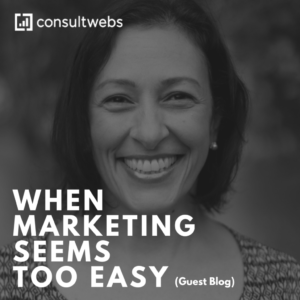 The practice of law is a confidence game. Even if you may not know exactly what you’re doing, you have to appear as if you do. It’s how you get and keep clients, win your cases, and ultimately grow your practice.
The practice of law is a confidence game. Even if you may not know exactly what you’re doing, you have to appear as if you do. It’s how you get and keep clients, win your cases, and ultimately grow your practice.
But it can be dangerous when the line between confidence and false confidence is crossed. Overconfidence bias appears when someone believes in their expertise more than evidence suggests they should. Have you ever had a client tell you exactly how to handle their case? As if they have a law degree? There’s no evidence to suggest that they know what they say they know, yet they firmly believe they’re right. They do this to their detriment – and yours.
Overconfidence can be a problem for growing a practice, especially when it comes to making marketing decisions. Not all lawyers have experience in law firm marketing – but many believe they know enough. I mean… how hard can it be? Honestly, having worked in the legal and marketing professions, I can say they seem easier the less you know, and in both, mistakes show up in the details. For instance, not all marketing strategies are created equal. For some practices in certain locations, a TV ad might make perfect sense. But change one aspect of your situation and television may be a waste of time and money. A novice may not be able to spot the details that make a specific marketing approach work.
Unfortunately, human beings aren’t great at gauging how hard something is. In fact, the harder a task is, the greater the risk of overconfidence bias. Humans generally underestimate learning curves because they don’t know what they don’t know. Everyone does this, at least once, without knowing it. It’s being human.
To protect ourselves from overconfidence bias, we need to adjust the way we see and handle certain situations. To ensure overconfidence bias doesn’t negatively affect your business or marketing decisions, consider doing the following as you decide on a marketing strategy or tactic:
- Second-guess your decisions. It’s uncomfortable to do sometimes, but it can be necessary. Ask yourself how you know what it is that you think you know. Is there evidence? Do you have data? Do you have substantial experience? If you can’t come up with a good answer, stop there. If you do have an answer, make sure you’re not being affected by what I call a “decision pitfall.” In other words, were you swayed by social expectations or some other mental short-cut? Did you tell yourself “this is what a successful lawyer would do” (acting on identity) rather than “this is what’s good for my business” (acting on objectivity)? Re-examining our decision-making processes can keep us from becoming overconfident.
- Set out to prove yourself wrong. We don’t generally do this, but if anyone is good at it, it’s a lawyer. To win a case, you have to see it from the other side, and then prepare for all contingencies. The same is true for the business side of your practice. You have to prove the counterargument to understand the strength of your own position. One way to do this is seek help from a marketing professional. Their greatest value isn’t always in executing a plan for you. Sometimes they can assist you by telling you where you may be going wrong with your marketing strategy leading you to a more customized approach to building your practice.
- Ask yourself what you fear and what you hope for, especially regarding your decision. And avoid acting on it. Many cases of overconfidence are really about emotional management. We “confidently” arrive at a decision because it’s what we want to have happen, or because it helps us avoid what we might be afraid of. If you really want a financially lucrative practice, you have to get understand the source of your decisions, even if it involves reaching out for help.
These days, self-awareness is praised as strong positive quality. It requires looking inward and being self-reflective. But we all have blind spots, to where all the introspection in the world won’t always give us true clarity. But if we look outside ourselves, specifically to what behavioral and social scientists have learned about human decision-making, we can be armed with knowledge to make better choices. “Know thyself” is a popular mantra but knowing and learning more about human decision-making generally can really take you, and your practice, to the next level.
Nika Kabiri, JD PhD, is a consultant and market researcher who uses Decision Science to help businesses grow. Check out her services and reach out to her to learn more about making optimal decisions for your practice.
The post When Law Firm Marketing Seems Too Easy: Overcoming the Perils of Overconfidence Bias appeared first on .
from https://www.consultwebs.com/blog/when-law-firm-marketing-seems-too-easy-overcoming-the-perils-of-overconfidence-bias/
via https://www.consultwebs.com
No comments:
Post a Comment